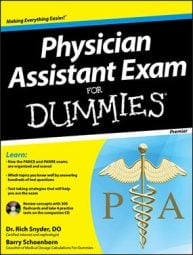There are many viral syndromes that you not only need to know about for the Physician Assistant Exam (PANCE), but likely have been exposed to during your life and medical career. Thank the stars for immunity!
Cytomegalovirus
Cytomegalovirus (CMV) is one of those viruses that can affect a lot of organs. From the liver to the eye to the intestine, it can cause much badness, to use professional medical terminology. Here are some key points about cytomegalovirus-related infection:
Cytomegalovirus infections are commonly seen in people with a suppressed immune system. Classic examples include people who’ve received solid organ transplants, those on chemotherapy, and people with HIV.
When cytomegalovirus affects the eyes, it can cause a chorioretinitis, which can result in vision loss. You see this condition in very advanced HIV infection.
Although cytomegalovirus can occur anywhere along the gastrointestinal tract, common clinical manifestations include cytomegalovirus esophagitis and cytomegalovirus colitis.
Cytomegalovirus can affect the liver and cause cytomegalovirus-induced hepatitis, usually a transaminitis.
You can diagnose either by culturing the affected tissue or by measuring antibody levels in blood. A common test for antibodies is the enzyme-linked immunosorbent assay (ELISA).
Under a microscope, you can see inclusion bodies in white blood cells that are definitive for cytomegalovirus.
Treating cytomegalovirus involves medications such as ganciclovir (Cytovene) and valganciclovir (Valcyte). These meds are usually first-line. When these two can’t be used, you can use foscarnet. The main side effect of ganciclovir is neutropenia, and one of the main side effects of foscarnet is hypocalcemia.
Herpes
You’ve likely heard the joke concerning the difference between love and herpes: “Herpes is forever.” Once you have it, you have it. The goal is to prevent recurrent exacerbations.
There are two herpes simplex viruses:
HSV-1 is a common cause of mouth ulcers, gingival infections, and pharyngitis. HSV-1 is usually transmitted via kissing.
HSV-2 is a cause of genital herpes. The key is in looking for herpetic lesions in the mouth or in the genital area.
Medical professionals used to simplify the diagnosis by assuming that HSV-1 occurred above the waist and HSV-2 occurred below the waist. However, sexual behaviors determine the spread of the virus, and either type can be found in each of these areas and can cause symptoms there.
The treatment for herpes simplex virus is similar to treatment for varicella. Commonly prescribed medications include acyclovir (Zovirax) and famciclovir (Famvir). There are distinct regimens for acute outbreaks and for reduction of transmission to partners.
With some of these infectious diseases, be aware of the histologic findings that can be in a question. With herpes simplex virus, you’re looking for a Tzanck smear showing large cells with multiple nuclei. With cytomegalovirus, you can see inclusion bodies that have an “owl’s-eye” appearance. With human papillomavirus, you can see koilocytes on a Pap smear.
Varicella
You may see the scenario of an older person who presents with pain in an extremity or along the trunk. The pain follows a dermatomal distribution. On examination, you see skin lesions that can be in various stages: Many are vesicular, and many of them may be crusted over. In addition, the person may have early lesions that are macular in nature.
The bottom line is that you remember the vesicular lesions in a dermatomal pattern that can hurt like the dickens in an older person. That’s varicella-zoster virus (VZV), also known as shingles, in a nutshell.
Here are a few key points concerning varicella:
It occurs very commonly in older adults because they have lowered immune systems. It can also occur in anyone who is immunocompromised.
The lesions typically occur in a dermatomal distribution because the virus can stay dormant in nerve cells for a long time and recur when the immune defenses are lowered.
People who are affected with varicella are given acyclovir (Zovirax) or a derivative thereof. To be most effective, this med usually needs to be given within 24 hours of when the rash began.
People over the age of 60 should get a varicella vaccination, which is just one injection.
In children, varicella-zoster is a cause of chicken pox. The clinical presentation is similar to that of shingles. If the child received the varicella vaccine, he or she can still get chicken pox, but it’s a milder form. The antiviral medications typically given to adults with shingles aren’t typically given to children unless their immune systems aren’t intact or they have significant underlying lung disease.
Be aware that significant nerve pain can occur with varicella, often after the acute flare is over. This is called post-herpetic neuralgia, and it can be debilitating. Medications used to treat this pain can include the tricyclic antidepressants, gabapentin (Neurontin), and topical capsaicin (Zostrix).
Epstein-Barr
Epstein-Barr virus (EBV) is the cause of mononucleosis, and infectious mononucleosis is a cause of viral pharyngitis, with posterior cervical adenopathy, exudative pharyngitis, and atypical lymphocytes later in the course of the disease. With mono, you also see splenomegaly, which also occurs in other EBV-related diseases. With severe Epstein-Barr virus, you can also see an autoimmune hemolytic anemia and a thrombocytopenia.
Epstein-Barr virus isn’t a cause of just mono. It can also cause hepatitis, which is characterized by elevated liver enzymes. Epstein-Barr virus has been implicated in certain malignancies and lymphoproliferative disorders, including Burkitt’s lymphoma, because high viral titers have been found in patients. In people who have undergone solid organ transplants, Epstein-Barr virus has been linked to a lymphoma that can occur post-transplant.
Titers of the virus can be ordered (look for an IgM titer, not so much an IgG, because everyone walking around likely has antibodies to Epstein-Barr virus). A monospot test can be ordered early on in the disease process. The treatment for Epstein-Barr virus is supportive.

